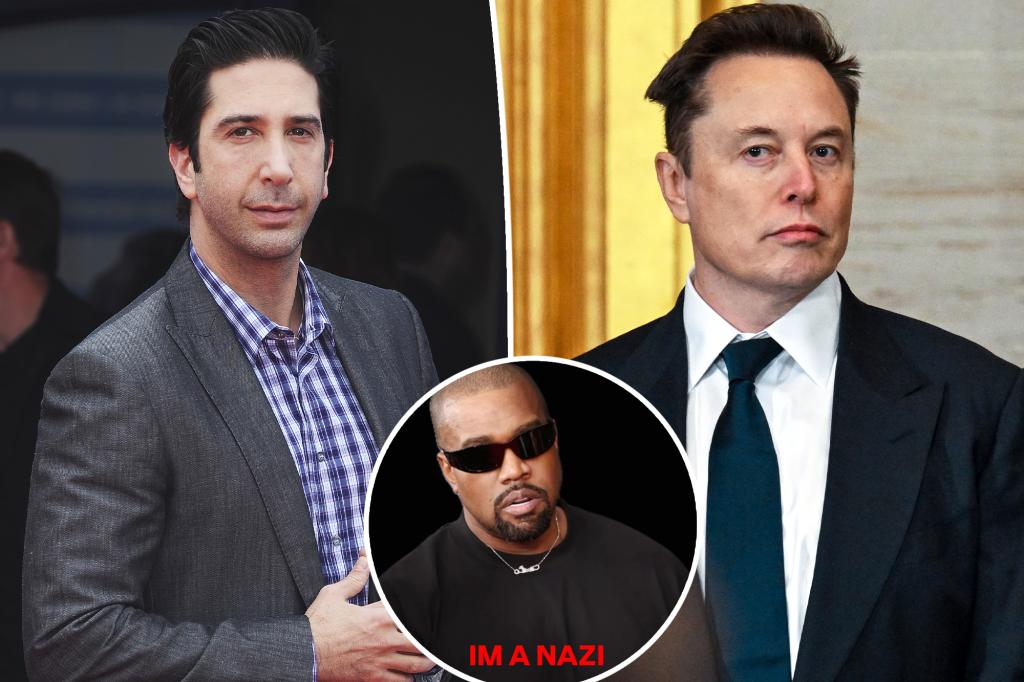David Schwimmer, the beloved actor known for his role as Ross Geller in the iconic sitcom Friends, recently made headlines for his strong stance against hate speech, particularly targeting Kanye West, the controversial rapper and public figure. Schwimmer took to Instagram on Saturday, October 7, 2023, to address a series of antisemitic and inflammatory tweets posted by West, urging Elon Musk, the owner of the social media platform X (formerly Twitter), to remove West from the platform. Schwimmer’s plea was direct and impassioned, highlighting the dangers of allowing hate speech to spread unchecked online. “We can’t stop a deranged bigot from spewing hate-filled, ignorant bile… but we CAN stop giving him a megaphone, Mr. Musk,” Schwimmer wrote. His words underscored the responsibility of social media platforms to curtail the amplification of hate and the potential real-world consequences of inaction.
The actor’s statement came in response to a barrage of offensive tweets from West, who has a history of making provocative and divisive remarks. In his latest posts, West, who now goes by the name Ye, made overtly antisemitic statements, including “I don’t like or trust no Jewish person, and this is completely sober with no Hennessy,” and “I’m a Nazi.” He also perpetuated harmful stereotypes, claiming that Jewish people “always gonna steal and invite you over to they house on Friday,” and even went so far as to express admiration for Adolf Hitler, writing, “Hitler was sooooo fresh.” These remarks were not just offensive; they were dangerous, as they legitimized hatred and violence against Jewish people and other marginalized communities. Schwimmer emphasized the gravity of the situation, pointing out that West has 32.7 million followers on X—a number that surpasses the global Jewish population. “His sick hate speech results in REAL LIFE violence against Jews,” Schwimmer warned, stressing the direct link between such rhetoric and acts of violence.
Schwimmer’s outrage was not limited to West’s words alone but also to the lack of widespread condemnation and action in response to them. The actor criticized the silence of many in the public eye and the broader society, arguing that such inaction equates to complicity. “I don’t know what’s worse, the fact that he identifies as a Nazi (which implies he wants to exterminate ALL marginalized communities including his own) or the fact that there is not sufficient OUTRAGE to remove and ban him from all social media at this point,” Schwimmer wrote. His words served as a call to action, urging people to speak out and demand accountability. “Silence is complicity,” he said, a phrase that has become a rallying cry for those advocating against hate speech and bigotry.
The controversy surrounding West’s tweets was not an isolated incident but part of a larger pattern of behavior that has drawn criticism and consequences in the past. West has long been known for his polarizing remarks, but his recent posts crossed a line even for a figure accustomed to pushing boundaries. In December 2022, he was banned from X (then Twitter) for posting a swastika and other offensive content, a suspension that lasted until the summer of 2023. His antics also led to professional repercussions, as Adidas severed ties with him following the backlash. Despite these consequences, West has continued to double down on his provocative statements, seemingly unapologetic and unrepentant.
The timing of West’s latest outburst was particularly notable, as it followed his appearance at the 2025 Grammys, where he sparked outrage with his behavior. West arrived at the event with his wife, Bianca Censori, who wore a sheer, nude-colored minidress that drew significant attention. West later bragged about the stunt on social media, writing, “I had dominion over [my] wife,” and dismissed critics as “broke bitches” who had no right to judge him. His comments were widely criticized for being misogynistic and self-aggrandizing, and they set the stage for the hateful rhetoric that followed. By praising Hitler and espousing antisemitic and racist views, West crossed into territory that even his most ardent supporters could not defend.
Schwimmer’s intervention in this matter highlights the importance of using one’s platform to stand against hate and bigotry. As a Jewish actor, Schwimmer’s personal connection to the issue lent his words additional weight, and his willingness to confront West directly demonstrated the kind of courage and conviction that is often lacking in public discourse. His message to Musk and the broader public serves as a reminder of the role that individuals and institutions must play in combating hate speech and protecting vulnerable communities. By amplifying Schwimmer’s plea, the public can send a clear signal that hate will not be tolerated and that accountability is essential in fostering a more just and inclusive society.
